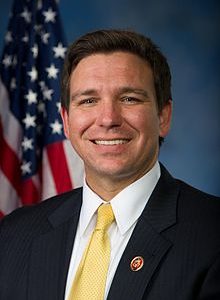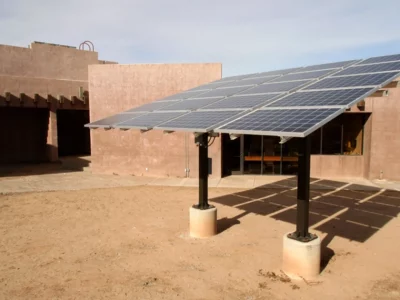renewable energy
That Was The Year That Was
The Biggest Environmental Stories of 2022
A lot has happened on the environmental front. Here are the biggest stories of 2022. Congress passed the Inflation Reduction Act, providing $369 billion in tax credit and spending to reduce carbon emissions. California banned the sale of new gas cars in 2035, with several other states now agreeing to follow suit. The Democrats lost …
Continue reading “That Was The Year That Was”
CONTINUE READINGDeSantis and the Environment
A Little Bit of Nepotism and a Lot of Everglades Protection.
Compared to Donald Trump, Ron DeSantis is practically a Greta Thunberg on environmental issues. Of course, by the same token, I’m practically a Steph Curry on the court compared to Danny DeVito. Sarcasm aside, DeSantis is pretty good on environmental issues for a Republican. But he rarely mentions climate change, and his record on renewable …
Continue reading “DeSantis and the Environment “
CONTINUE READINGEnergy Price Shocks and the Failures of Neoliberalism
Why it’s time to rethink electricity market design to ensure a clean and equitable energy future
This post was originally published on the Law and Political Economy blog. The global energy price shocks of the past two years have made it painfully clear that energy cannot be treated as an ordinary commodity and that many governments have been insufficiently attentive to energy security. Given its dependence on Russian gas, the EU has …
Continue reading “Energy Price Shocks and the Failures of Neoliberalism”
CONTINUE READINGClimate Change and Indian Country
The tribes are on the front lines of climate change.
In light of Native American Heritage Day last Friday, we should also be thinking about the future of the tribes in the era of climate change. Tribes face serious challenges from climate change, but also some potential opportunities. In terms of climate impacts, many tribes are at high risk. Tribes are especially vulnerable to climate …
Continue reading “Climate Change and Indian Country”
CONTINUE READINGThe Inflation Reduction Act and California Offshore Wind
There May Be Workarounds for Delays in Offshore Wind Created by IRA Section 50265
Various measures in the Inflation Reduction Act (IRA), signed into law on August 16, 2022, create new momentum for offshore wind in California. However, as with all things in life, it’s never that simple. In this case, the IRA ties offshore wind (OSW) leases to offshore oil and gas auctions and prevents OSW leases from …
Continue reading “The Inflation Reduction Act and California Offshore Wind”
CONTINUE READINGIRA’s Impact
The new law is a Big Deal. Or more precisely, a REALLY Big Deal.
IRA, the Inflation Reduction Act, is clearly the biggest climate legislation ever passed in the United States. The law will provide $379 billion in subsidies to clean energy in the form of direct payments and tax credits. Subsidies aren’t the ideal way to cut emissions, because it’s impossible to target them to the precise behavioral …
Continue reading “IRA’s Impact”
CONTINUE READINGA Great Day for Climate Policy
A short video explainer of why passage of the IRA bill is such a big deal.
We all have something to celebrate with the House passage of the IRA on Friday. Getting it passed required some difficult compromises, but the bill represents a major step forward. Because of the Mar-a-Lago search, it hasn’t gotten nearly as much attention as it deserves. If you don’t have time for a lot of details, …
Continue reading “A Great Day for Climate Policy”
CONTINUE READINGThe Inflation Reduction Act and the Sequencing of Climate Policy
Why subsidies for clean energy generally are preconditions for other climate policies
The Inflation Reduction Act would be, if enacted, the biggest piece of climate legislation that the U.S. Congress has ever passed. As such, it’s gotten a fair amount of coverage attempting to put it into context for the broader scope of climate policy in the U.S. and globally – in particular, this article in Slate …
Continue reading “The Inflation Reduction Act and the Sequencing of Climate Policy”
CONTINUE READINGThe Major Money Doctrine
Senate passes biggest climate legislation ever.
In June, the Supreme Court trimmed EPA’s power to regulate greenhouse gases. The Court used the “Major Question Doctrine,” which says that issues of “vast political and economic significance” must be decided by Congress. Senate Democrats gave their response on Sunday: the Major Money Doctrine. They passed the Inflation Reduction Act (IRA), which provides over …
Continue reading “The Major Money Doctrine “
CONTINUE READINGThe climate bill and oil and gas leasing
Provision in big climate bill that mandates oil and gas leasing on federal lands has limited reach
The big news in climate policy this past week was Senator Joe Manchin (D-WV) signing off on a deal with the Democratic Senate Majority leader, Chuck Schumer, to spend hundreds of billions of dollars on climate investments – the bill is catchily called the Inflation Reduction Act of 2022. I’ll take a look at the …
Continue reading “The climate bill and oil and gas leasing”
CONTINUE READING








